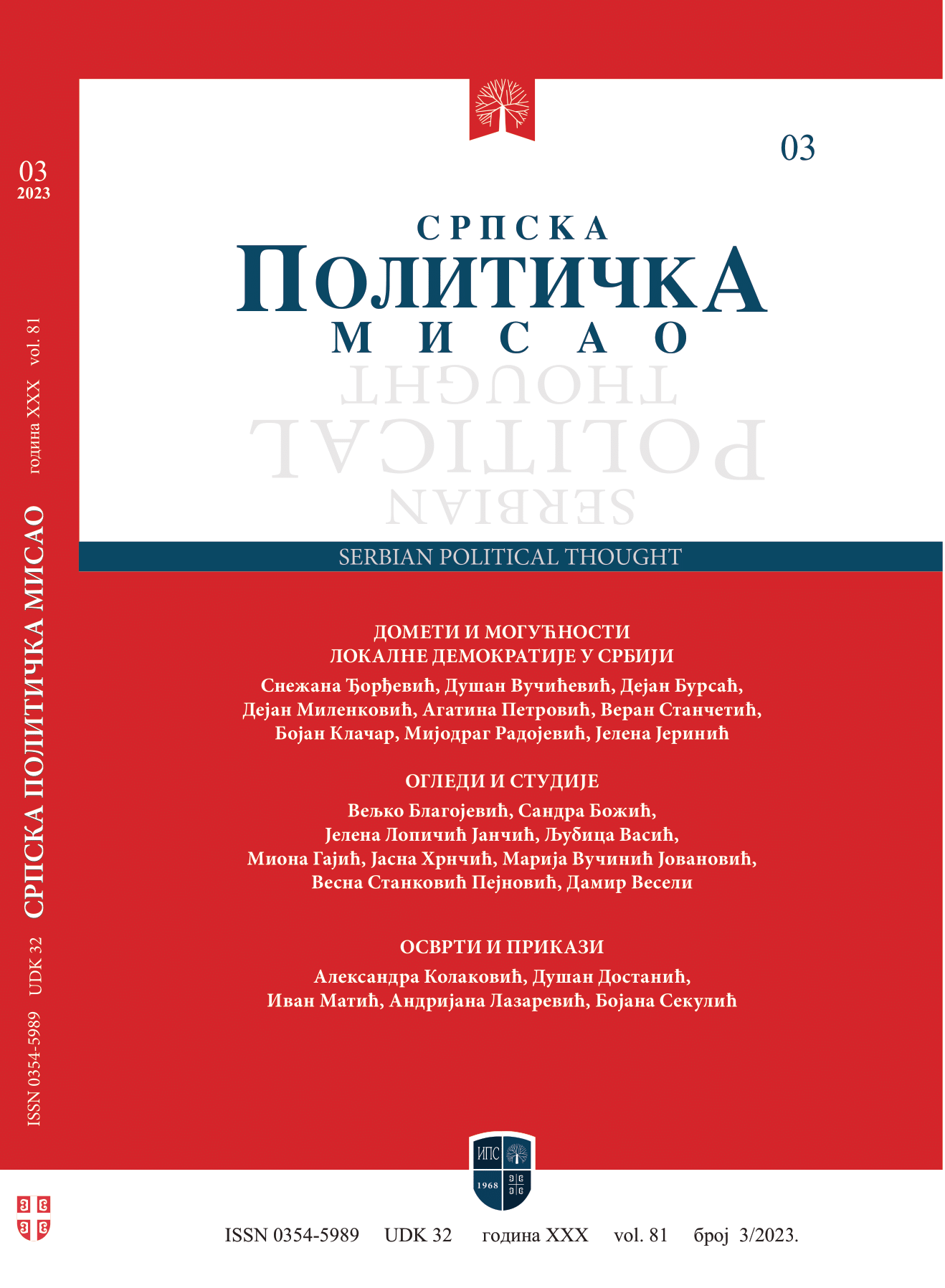THE INFLUENCE OF THE GREAT POWERS ON THE NATIONAL INTERESTS OF THE REPUBLIC OF SERBIA
Abstract
The topic of this work refers to the examination of the influence of great powers on the national interests of the Republic of Serbia for the purpose of analysing the strategic environment that precedes the definition of a deterrence strategy under conditions of military neutrality. National interests are best understood as fundamental and enduring needs, desires, or streams that help determine the goals of national security policy.
National interests and their importance can be categorized in different ways and are most often considered in a practical sense as existential, vital and others. For the Republic of Serbia and the majority of the Serbian people, the national interest in preserving sovereignty and territorial independence, which is threatened by the illegal declaration of independence of AP KiM, represents the greatest threat to freedom and independence as basic national values. The defence of AP KiM and its preservation in the constitutional and legal order of the Republic of Serbia is an existential national interest, the realization of which requires the engagement of all instruments of the national power of the Republic of Serbia. A negative influence on the realization of this interest comes from the external and internal environment. In accordance with the above, and taking into account the limitations in the requirements for the preparation, the paper focuses on the basic question: how do great powers affect the existential national interest of the Republic of Serbia?
In the theoretical-methodological approach, a theoretical analysis of the terms national interests and values was used, a classification of national interests was carried out based on modified analytical approaches, and the relationship between the influence of great powers on the existential national interest of the Republic of Serbia was examined. The results of the research indicate that, despite changes in the geopolitical environment that indicate the emergence of a multipolar world, the actions of major powers have a predominantly negative impact on the existential national interest. Such a fact requires the search for measures to reduce strategic risk in order to mitigate and eliminate the negative effects of the actions of the great powers and to connect Serbian national interests with the interests of powers that have a positive impact on the national security interests of the Republic of Serbia.
References
Bocan‒Harčenko Aleksandar. 2020. ,,Spoljna politika Rusije i rusko‒srpski odnosi“, Napredak, 2: str 7-16.
Bžežinski, Zbignjev. 1999. Velika šahovska tabla, Podgorica: CID
Vračar, Milinko, Milkovski, Vangel, ,,Strategijski pristup Republike Srbije u rešavanju kosovskometohijskog problema.“ Nacionalni interes, 3: str. 51-71.
Dimitrijević, Ivan, Lipovac, Milan. 2017. ,,Nacionalni interesi Republike Srbije: analiza ekspozea mandatara vlade od 2007. do 2017. godine, Srpska politička misao, 3: str. 71-97.
Mala politička enciklopedija. 1966. Beograd: Savremena administracija
Petrović, Dragan, Đukanović, Dragan, 2012. Stubovi spoljne politike
Srbije – EU, Rusija, SAD i Kina, Beograd: Institut za međunarodnu politiku i privredu
Radinović, Radovan. 2019. ,,Srbija u raljama geopolitike.“, Politika nacionalne bezbednosti, 1: str. 53-73.
Rezolucija o zaštiti suvereniteta, teritorijalnog integriteta i ustavnog poretka Republike Srbije. Preuzeto 10.05.2023. sa internet adrese: http://www.parlament.rs/narodna-skupština.115.html
Stajić, Ljubomir, Gaćinović, Radoslav. 2007. Uvod u studije bezbednosti, Beograd: Draskar partner
Stojanović, Stanislav, Đorđević Branislav. 2017. ,,Svetsko društvo rizika i zaštita nacionalnih interesa Republike Srbije“, Međunarodni problemi, 69: str. 465-482.
Strategiji nacionalne bezbednosti Republike Srbije (94/2019-13)
Frankel Joseph 1970. National Interest, New York: Praeger Publishers,
General Affairs and External Relations. 2003. 2518th Council meeting, Luxemburg, 16 June 2003, The Thesaloniki Agenda for the Western Balkans: Mowing towards European Integration
Nuechterlein Donald E. 1976. “National Interests and Foreign Policy: A Conceptual Framework for Analysis and Decision-Making”, British Journal of International Studies, 3: pp. 246- 266.
Roskin, Michael. 1994. National Interest: From Abstr om Abstraction to Strategy, US Army War College Quarterly: Parameters

